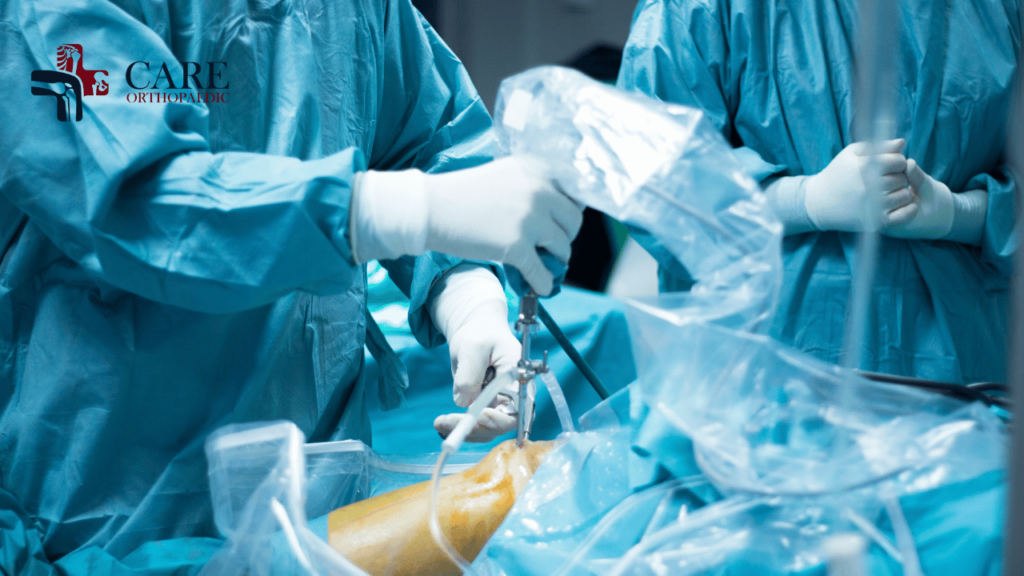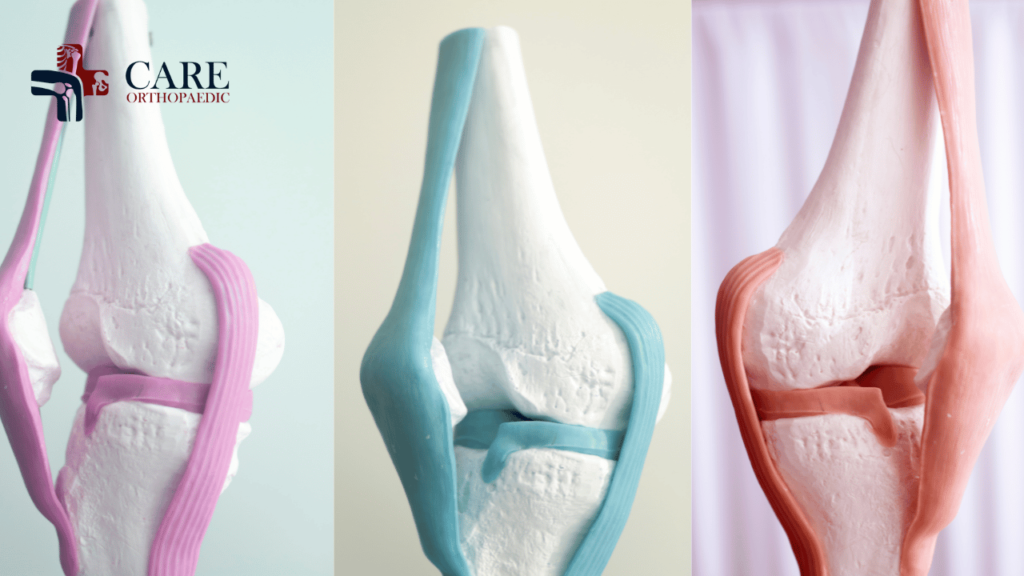Overview
Just picture being pain-free once more when running, walking, or climbing stairs. Many patients that suffer chronic knee pain are getting a real chance to achieve it through the aid of Total Knee Replacement in Mumbai. The quality of life might be greatly diminished as well as your ability to carry out everyday duties impeded by knee stiffness. Still, picture yourself having the ability to travel back in time and regain the flexibility you once had. That’s where the experience of CareOrthopaedics, an organization of renowned Orthopaedic physicians dedicated to enhancing lives via state-of-the-art treatment plans, comes forward.
What are the Different Types of Total Knee Replacement Procedures?
When thinking about a complete knee replacement in Mumbai, you must understand the many surgical options that are offered. The following are the main groups into which knee replacement procedures fall:
- A standard total knee replacement: Involves making a wide incision to get to the knee joint, and prostheses are used to substitute the removed cartilage and bone.
- Minimally invasive surgery (MIS): Reduced tissue injury and accelerated healing are the goals of minimally invasive surgery (MIS), which makes small incisions.
- Partial Knee Replacement: Such a nonsurgical alternative maintains a greater portion of the patient’s natural knee and is appropriate for those whose damage is limited to a certain location.
- Robotic-Assisted Surgery: As a trailblazer in Mumbai, Dr. Supreet Bajwa employs this advanced technique to improve knee replacement outcomes and enhance accuracy.
Every therapy has advantages of its own and is chosen according to the patient’s demands, anatomy, and specific ailment. Selecting the appropriate course of action for your circumstances might be aided by speaking with a CareOrthopaedics professional.
How Long Does a Total Knee Replacement Surgery Typically Last?
Depending on the surgical approach taken and the intricacy of the case, the length of a complete knee replacement in Mumbai might change. The procedure typically takes one to two hours to complete. This is an overview in general:
- Anesthesia and Preparation: 30 to 45 minutes
- Procedure: 1-2 hours for surgery
- Anesthesia recovery: one to two hours
Patients should also think about the time needed for recuperation following surgery and preoperative planning. A more individualized timeframe will be provided by a thorough assessment performed by your surgeon, like Dr. Supreet Bajwa.
What are the Potential Risks and Complications of Total Knee Replacement?
Though having a complete knee replacement in Mumbai usually appears healthy, it’s crucial to be aware of the possible hazards and issues:
- An infection: While post-surgical infections are rare and often preventable with proper care, they can occur.
- Blood Clots: Upon surgery, a patient may develop a blood clot in their extremities or lungs.
- Implant-related issues: The prosthetic joint may occasionally wear out or loosen.
- Rare but conceivable: Nerve or blood vessel damage can cause problems that are either short-term or long-term.
Discussing these risks with your surgeon may help ease your concerns and develop a preventative strategy to minimize issues.

What is the Recovery Process Like After Total Knee Replacement Surgery?
The key period of recovery following total knee replacement in Mumbai consists of many stages:
- Immediately following surgery: patients are often urged to stand and walk with help in less than a day.
- Hospital Stay: After surgery, the majority of patients spend two to four days in the hospital.
- Rehabilitation: To regain strength and movement, physical treatment begins right away.
- Home recovery: Several weeks to months of continued physical treatment administered at home or in an outpatient facility.
Within the first few weeks, pain and function should improve; nevertheless, a complete recovery may take up to six months or a year. Recovery after surgery depends on you adhering to your physical therapist’s and surgeon’s instructions.
How Long Do Total Knee Replacements Last?
The kind of implant, the degree of activity level of the patient, and their general health are some of the variables that affect how long a complete knee replacement in Mumbai lasts. Knee replacements typically last between 15 and 20 years. Among the crucial elements affecting durability are:
- Install Material and Design: State-of-the-art components and designs provide increased durability.
- Surgical Technique: The longevity of a knee replacement can be affected by surgical precision, such as that employed by Dr. Supreet Bajwa using robotic assistance.
- Post-Surgery Care: You may extend the life of your implant by following the suggested activity levels and avoiding high-impact activities.
What are the Alternatives to Total Knee Replacement Surgery?
There are a few options available for those in Mumbai who are not prepared for a total knee replacement:
- Medication: Anti-inflammatory and painkillers can be used to treat symptoms.
- Physical therapy: Knee function can be enhanced with activities that build strength and flexibility.
- Injections of corticosteroids: These can reduce inflammation and discomfort momentarily.
- Cooled Radiofrequency Ablation: This innovative non-surgical method of treating persistent knee pain is provided by Dr. Supreet Bajwa.
In more severe cases of knee injury, these options could postpone but not entirely eliminate the need for a total knee replacement.
What lifestyle changes are recommended After Total Knee Replacement?
Following surgery, patients must modify their lifestyle in order to have long-term success:
- Frequent Exercise: Low-impact sports like cycling or swimming support the maintenance of joint health.
- Weight control: Keeping a healthy weight lessens the strain on the knee joint.
- A well-balanced diet rich in nutrients promotes general health and healing.
- Steer Clear of High-Impact Activities: To avoid putting too much strain on the knee, try to avoid high-impact activities like jogging and leaping.
Making these adjustments can improve your knee replacement’s durability and success rate considerably.
Why Choose CareOrthopaedics for Total Knee Replacement in Mumbai?
Given a number of strong factors, CareOrthopaedics is a top option for complete knee replacement in Mumbai.
- Experienced surgeons: The group delivers a wealth of knowledge and experience, led by Dr. Supreet Bajwa, a globally educated authority in hip and knee surgery.
- High-Technology: Using robotic-assisted surgery together with other modern technology guarantees accuracy and best results.
- Complete Care: CareOrthopaedics offers a patient-centered, comprehensive approach, ranging from preoperative consultations to postoperative treatment.
- Numerous Places: Individuals can obtain top-notch care near to home thanks to availability in multiple medical centers across Mumbai.
Selecting CareOrthopaedics entails choosing a committed staff that puts your health and recuperation first, guaranteeing you may confidently resume your preferred activities.

Conclusion
To sum everything up, to people who have ongoing knee issues, complete knee replacement in Mumbai provides a route to pain-free life and regained movement. You may significantly enhance your quality of existence with the right knowledge, skilled medical care, and a dedication towards a healthy way of life. Your reliable companion on this path to improved knee health is CareOrthopaedics, with its advanced methods and skilled staff under the direction of Dr. Supreet Bajwa.
FAQs
1. After a complete knee replacement, when can I start driving?
Ans. The majority of patients are able to get back behind the wheel 4-6 weeks after an operation, contingent upon how well they heal and how comfortable they are.
2. Can I bend my knees after having both knees replaced?
Ans. Even though it might be painful, many patients can kneel with enough time and practice. Talking about methods with your physical therapist might be beneficial.
3. Will I eventually require a second surgery?
Ans. Although they are less often, revisions may be necessary if the implant fails or problems develop. The lifespan of implants has been greatly extended by technological advancements.
4. After having knee replacement surgery, may I travel by air?
Ans. Sure, but it’s best to wait at least four to six weeks after surgery and ask your surgeon for specific advice before doing so, particularly for lengthy travels.
5. During a complete knee replacement procedure, what kind of anesthetic is used?
Ans. Anesthesia is often injected either locally (spinal or epidural) and generally. In light of your choices as well as your health, the anesthesiologist will talk you through the most appropriate alternative.


